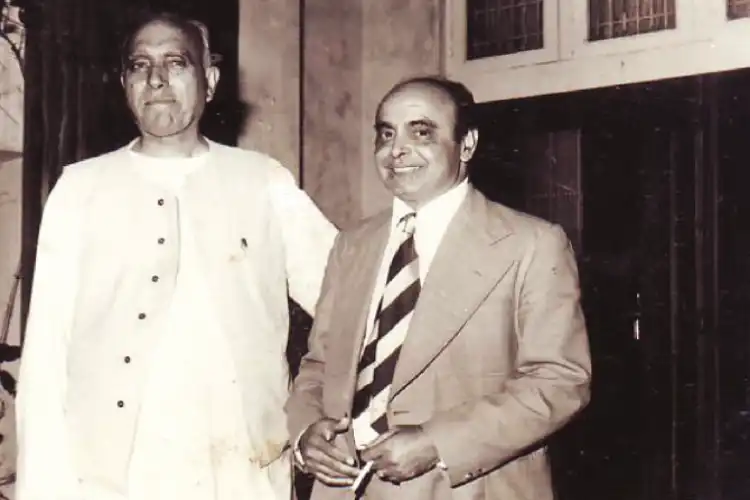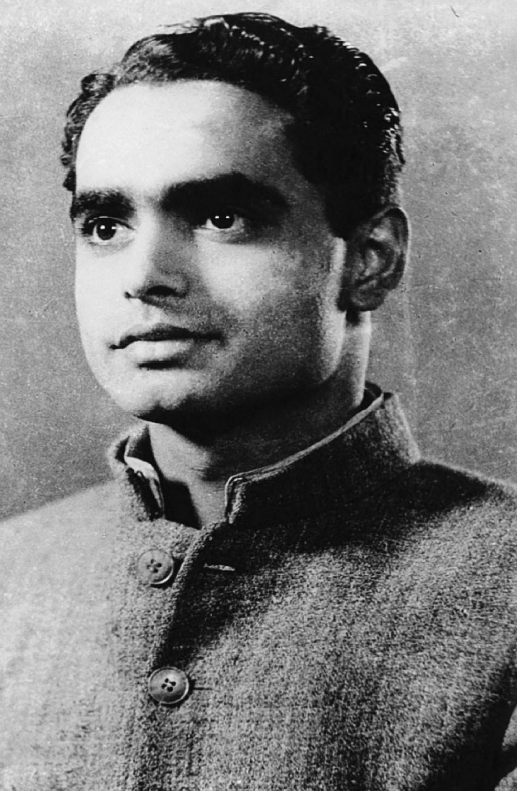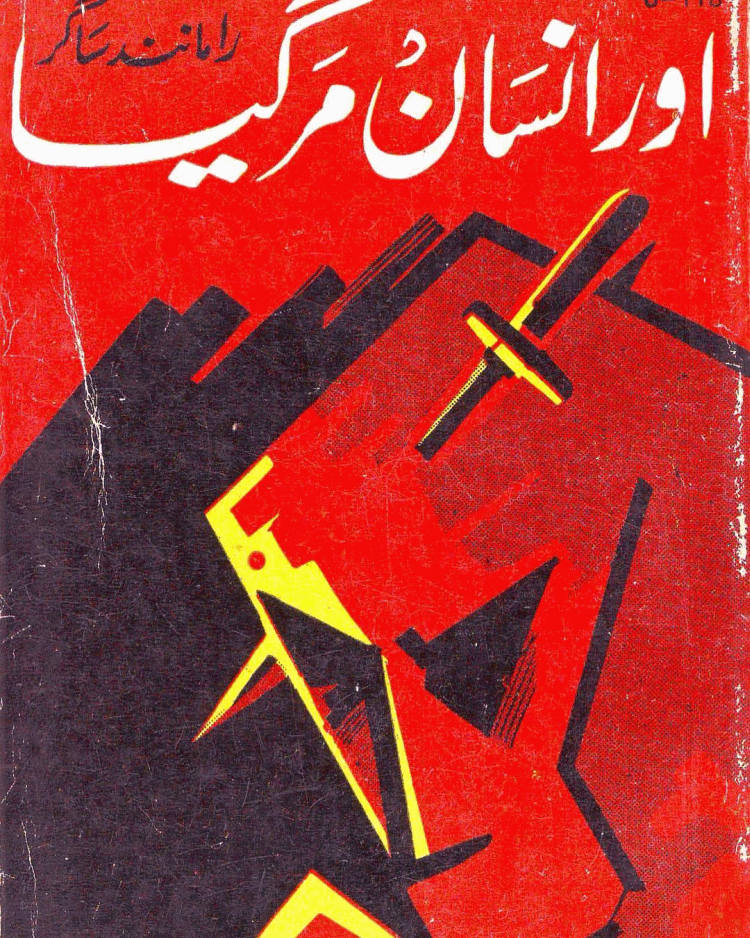
“Fortunately, or unfortunately, Ramanand Sagar is not a member of any political party. He belongs to the party of humans. He has been exalted to those high ranks of artists who are carrying the flag of humanity.” Khawaja Ahmad Abbas wrote in the foreword to Aur Insaan Mar Gaya, an acclaimed and famous Urdu novel by Ramanand Sagar.
Ramanand Sagar is best known for his magnum opus Television Serial Ramayan. The TV serial was written, produced, and directed by him in 1987, which took the nation by storm. People in India mostly know him as a filmmaker who produced and directed classics like Arzoo, Ghunghat, Zindagi, and Ankhen. He was such a giant of cinema and TV that we often overlook the fact that he was one of the most prominent Urdu writers of his time.
Sagar was a very well-read scholar of Persian and Urdu. His son, Prem Sagar, writes, “in 1942, (he) was awarded the prestigious title of Munshi Fazal (Ph.D. in Persian) by Punjab University. He won two gold medals and topped in the highest degree examinations for Urdu and Persian, and was conferred the title of ‘Adib-e-Alam’.”

Ramanand Sagar in his younger days
Sagar started his career as a journalist for Daily Milap, an Urdu daily published from Lahore, and rose to become its editor. In 1941, he was admitted at a sanatorium in Kashmir with Tuberculosis (TB). TB was a deadlier disease in those days and doctors believed that Sagar wouldn’t survive. But, “a man cannot be defeated”.
Sagar started penning down his experiences in a sanatorium. Prem writes, “he started sending his writings to Adab-e-Mashriq, a famous Urdu literary magazine of the 1940s in Lahore, under the title ‘Maut Ke Bistar Se’ or ‘Diary of a TB Patient’. The editor of the magazine was deeply moved by his writing and the paradox of a man destined for death in a sanatorium showing others the way to live.” The series became very popular and by the time Sagar left the sanatorium, he was an established Urdu writer.
Calamities, pain, and sorrow inspire great literary works. The Partition of India stirred Sagar’s soul. He was forced to leave his home in Lahore and take refuge in Srinagar. He had witnessed the worst face of humans. He wanted to tell society that hate would not leave anyone untouched. Aur Insaan Mar Gaya, took birth in his heart, which would go on to become one of the most acclaimed Urdu novels written on the tragedy.
Sagar was living with his family, as a refugee, in Srinagar when on 27 October 1947, the reality struck that once again they had to become refugees of refugees. Pakistan invaded Kashmir.
A Dakota DC-3 was employed to evacuate stranded citizens. People were asked not to carry luggage so that more people could be accommodated on the plane. Biju Patnaik was the pilot and he saw a man with a trunk over his head. A furious Patnaik shouted, “You are a greedy man! Taking your wealth with you at the cost of a human being” and kicked open the trunk. The trunk was full of handwritten notes. The man was Sagar, who was now in tears as he said, “These are notes for my novel Aur Insaan Mar Gaya , my crushed feelings, my sentiments about the futility of war and the need for peace. This is the only wealth I am carrying with me!” Patnaik immediately recognized him as a famous writer and touched his feet. The family safely landed in Delhi.

The cover of Aur Insaan Mar Gaya
Sagar was no armchair intellectual. Kashmir was being invaded. People were being killed. Women were being raped. How could he sit and write in Delhi? He left his family in the custody of Muslim friends in a Muslim locality of Delhi and went back to Kashmir. Imagine, a man uprooted from Lahore by communal violence a few months ago was trusting his Muslim friends with the lives of his family.
Sagar was not alone. Several other literary giants of the time joined him in Kashmir. Khwaja Ahmad Abbas, Rajinder Singh Bedi, Chandrakiran Sonrexa, Navtej Singh, Sher Singh, and Raj Bans Khanna were a few prominent writers along with Sagar, who had reached the war front. Abbas recalled, “The atmosphere reminded one of Spain and the International Brigade where, it was said, writers had come to live their books, and poets had come to die for their poetry!”
Aur Insaan Mar Gaya was completed at this war front. Abbas described Sagar, “someone was reading out a story when I entered the room. He was Ramanand Sagar. A romantic man of taste, Ramanand Sagar. He had reached Delhi as a pauper refugee, a few days ago, with his family. And, he immediately returned, leaving his wife and children there, to the war front. He was reading the first chapter of his novel…… He was narrating the novel and for me he was a personification of the light of hope and humanity. He was that small ray of light that shows the path in the darkness. There was no more darkness, as I had found a pearl of light.”
Sagar described Aur Insaan Mar Gaya as, “Love is not as strong as the hate is. I want to invoke hate in you with this novel. So that your sentiments are stronger and steadfast….. If I have made you hate these killings, rapes, and violence from the bottom of your heart, then I will believe myself, and the novel, successful.”
In Prof. Ishtiaq Ahmad's opinion, "Aur Insaan Mar Gaya (And Humanity Died) enjoys the reputation of being the most humane and politically neutral novel on the Partition”.
The novel was well-received by critics and established Sagar as one of the giants of Urdu writing. A question is often asked why did he stop producing literary works? He did write for films but stopped writing stories and novels. The answer was given by him in a form of a forecast.
ALSO READ: Modis keep it simple as matriarch Hiraba turns 100
In his introduction to Aur Insaan Mar Gaya, written in July 1948, Sagar wrote, “There is a lot inside me which wants to come out of me in form of writing. But, I realize that for a long time to come, I would not be able to write something for only literary purposes. because the need to fill my stomach has become more painful than feeding my soul and intellect."
